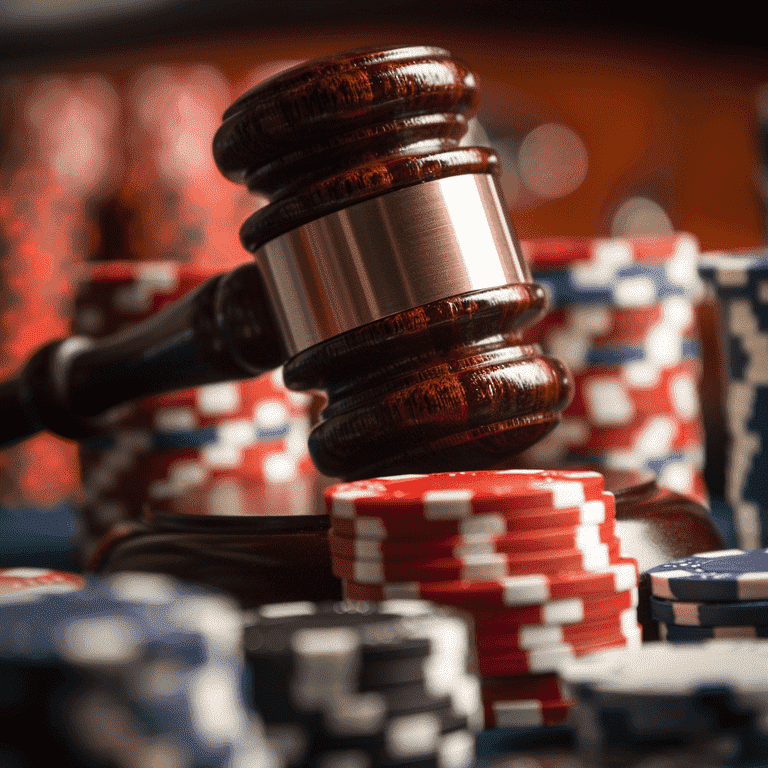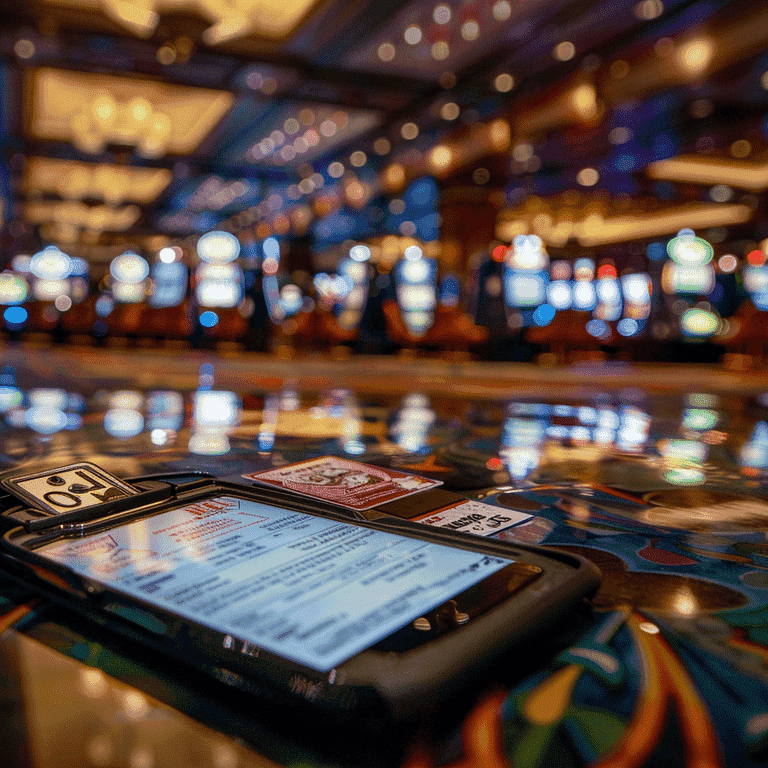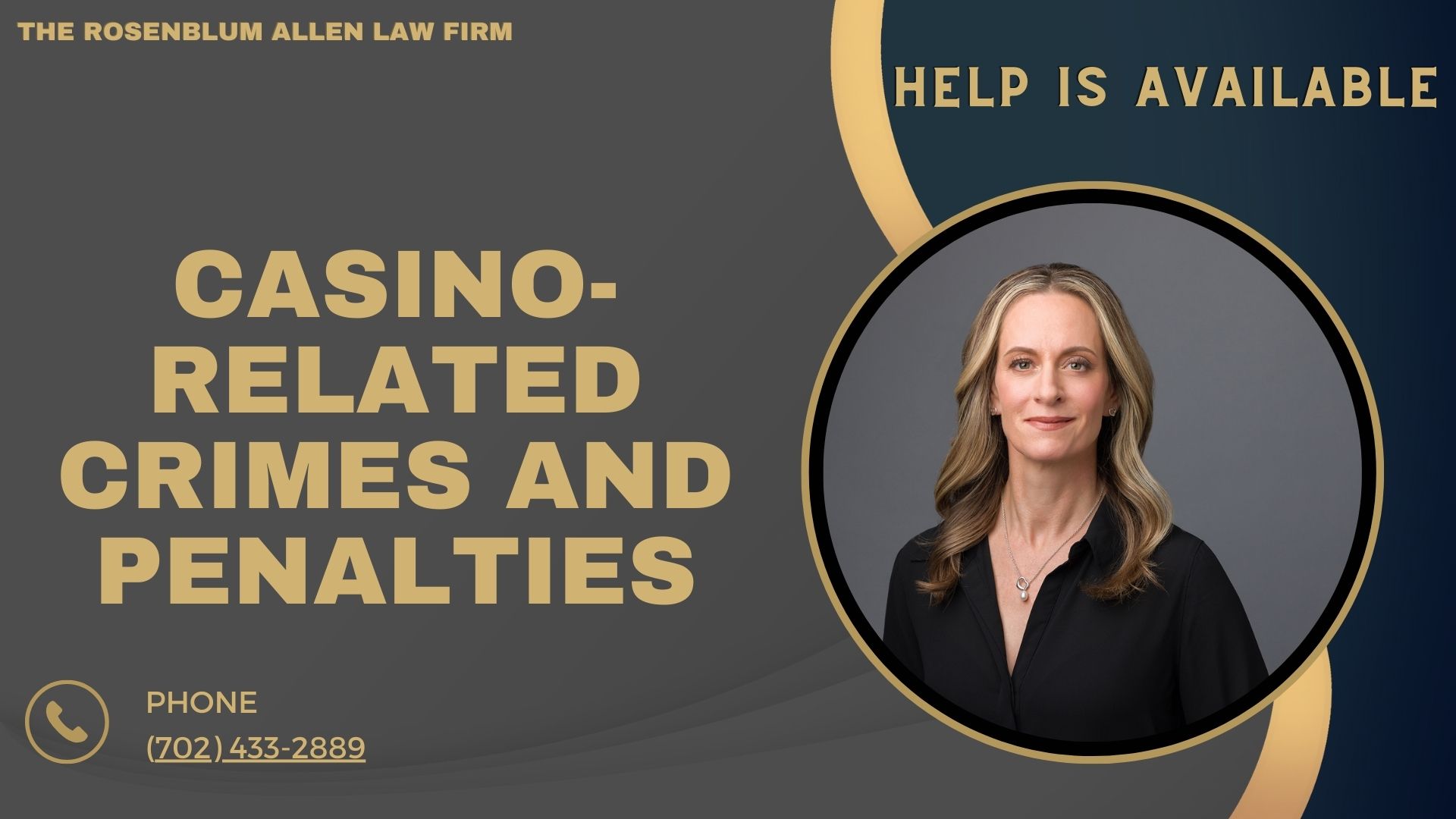Casinos are thrilling places filled with excitement but can also be hotspots for criminal activity. Understanding the various crimes that can occur in casinos and the penalties that follow is crucial, whether you’re a regular visitor or just curious. This guide will walk you through the common types of casino-related crimes, the legal consequences, and what you should know to stay on the right side of the law.
Common Casino-Related Crimes
Fraud and Cheating
Casinos are places where people try their luck, but some try to tilt the odds in their favor illegally. Fraud and cheating are among the most common crimes in casinos.
Methods of Casino Fraud
Casino fraud can take many forms. Here are some of the most common methods:
- Card Marking: Players mark cards in a way that allows them to identify them later.
- Collusion: Multiple players work together to cheat the game, sharing information or signaling each other.
- Chip Dumping: In poker, a player intentionally loses chips to a partner who can cash them out.
- Counterfeit Chips: Using fake chips to gamble or cash out.
Cheating at Games
Cheating can happen in almost any casino game. Here are a few examples:
- Slot Machines: Tampering with machines to alter outcomes.
- Roulette: Using devices to influence the spin of the wheel.
- Blackjack: Counting cards isn’t illegal, but using devices is.
Legal Consequences of Fraud and Cheating
The penalties for fraud and cheating in casinos can be severe.
- Fines: You could face hefty fines if caught cheating or committing fraud in a casino. These fines can range from a few thousand dollars to much more, depending on the severity of the crime.
- Jail Time: Jail time is also a possibility in many cases. Even first-time offenders can face months to years behind bars.
- Criminal Record: A conviction will leave you with a criminal record, impacting future employment and other areas of your life.
Money Laundering
Casinos can be used as vehicles for laundering money, making it appear as if it comes from legitimate sources.
How Money Laundering Occurs in Casinos
Money laundering in casinos typically involves buying chips with dirty money and then cashing them out as if they were winnings. The process makes the money look clean. Other methods include using multiple small transactions to avoid detection, known as “smurfing.”
Legal Framework for Combating Money Laundering
Governments take money laundering seriously, and casinos are no exception. Here’s how they combat it:
- Anti-Money Laundering (AML) Regulations: Casinos must follow strict AML laws requiring them to monitor large transactions and report suspicious activities to authorities.
- Reporting Requirements for Casinos: Any transaction over a certain amount, typically $10,000, must be reported. This makes it harder for criminals to launder large sums without drawing attention.
Theft and Robbery
Theft and robbery are severe offenses in any context, but in casinos, they come with added risks.
Types of Theft in Casinos
Theft in casinos isn’t just about stealing from other patrons. Here are the common types:
- Employee Theft: Casino employees may steal chips, cash, or data. This could involve anything from skimming small amounts to more elaborate schemes.
- Patron Theft: This includes stealing chips or cash from other players at the tables or in less secure casino areas.
Casino Robbery Incidents
While rare, casino robberies do happen and can be pretty dramatic. These crimes often involve armed perpetrators and high-speed getaways, adding to the danger for everyone involved.
Legal Ramifications for Theft and Robbery
The consequences for theft and robbery in a casino can be severe:
- Sentencing Guidelines: Depending on the amount stolen and the circumstances, sentences can range from probation to long-term imprisonment.
- Restitution Requirements: Offenders may also be required to pay back what they stole, which can add to their financial burden.
The penalties for casino-related crimes can vary widely depending on the nature and severity of the offense. Understanding the potential consequences is crucial, whether you face charges or want to stay informed.

Penalties and Sentencing
Misdemeanor vs. Felony Charges
Not all crimes are created equal. In casino-related offenses, the distinction between misdemeanor and felony charges is significant.
Differences Between Misdemeanor and Felony Casino Crimes
- Misdemeanor Charges: These are generally less severe crimes, such as minor theft or first-time offenses that don’t involve violence or large sums of money. Penalties might include small fines, community service, or short-term jail sentences (usually less than a year).
- Felony Charges are more serious crimes, such as large-scale fraud, robbery, or crimes involving violence. They can result in significant prison time (over a year), hefty fines, and a permanent criminal record that can affect your life long-term.
Examples of Each and Their Respective Penalties
- Example of a Misdemeanor: A person caught trying to cheat at a low-stakes game might face a misdemeanor charge. They could end up with a fine and a short stay in county jail.
- Example of a Felony: Someone involved in a large-scale money laundering operation at a casino would likely face felony charges, leading to years in prison and possibly millions in fines.
Sentencing Guidelines
Several factors guide sentencing for casino-related crimes. Understanding these can help you grasp what might influence the final judgment.
Factors Influencing Sentencing
- Severity of the Crime: More severe crimes, like armed robbery or major fraud, will naturally lead to harsher sentences. The more harm done, the longer the potential jail time.
- Criminal History: A person with prior convictions, especially for similar offenses, will likely receive a stiffer sentence. Repeat offenders rarely get leniency.
- Role in the Crime: If you played a minor role, you might get a lighter sentence than the ringleader.
Typical Sentences for Casino-Related Crimes
- Theft and Fraud: Depending on the amount involved, sentences can range from probation to several years in prison.
- Robbery: Armed robbery or similar violent crimes can lead to 10 years or more behind bars.
- Money Laundering: Sentences for large-scale operations can extend into decades, especially if federal charges are involved.
Fines and Restitution
In addition to jail time, financial penalties often accompany casino-related crimes.
Financial Penalties Imposed
Fines can vary widely based on the crime:
- Misdemeanor Fines: These can range from a few hundred to several thousand dollars. They are typically imposed for lesser offenses.
- Felony Fines: For more severe crimes, fines can reach tens or even hundreds of thousands of dollars, mainly if the crime involved significant monetary gain.
Restitution to Victims and the Casino
Restitution is often ordered in addition to fines. This involves paying back the victims for their losses:
- Victim Restitution: If your crime directly harmed another person, you might be required to compensate them financially.
- Casino Restitution: Casinos often seek restitution for any losses they suffered due to the crime, such as stolen money or damaged property.
Probation and Parole
In some cases, you might be sentenced to probation or parole instead of—or in addition to—jail time.
Conditions of Probation for Casino Crimes
Probation allows you to avoid jail, but you must meet certain conditions:
- Regular Check-ins: You may be required to meet with a probation officer regularly.
- Employment Requirements: You might need to maintain a job or participate in community service.
- Avoiding Further Crime: Committing another crime while on probation can lead to immediate imprisonment.
Violation Consequences
Violating probation or parole conditions can have serious repercussions:
- Revoke Probation: If you violate the terms, the court may revoke your probation and send you to jail for the original sentence.
- Extended Sentences: Violations can lead to additional charges and longer sentences.

Casino Employee Licensing
If you work in a casino, your job likely requires a special license. This is because casinos are highly regulated environments, and employees are expected to uphold strict standards of conduct. Committing a crime can put your license—and your job—at risk.
How Criminal Charges Affect Licensing
When it comes to keeping your casino employee license, here’s what you need to know:
- License Revocation or Suspension: If you’re charged with a crime, especially one related to theft, fraud, or violence, the licensing authority may suspend or revoke your license. This could mean losing your job, even before a trial or conviction.
- Background Checks: Most casinos perform regular background checks on their employees. If you’re convicted of a crime, it will appear on these checks and could lead to disciplinary action or termination.
- Reapplication Difficulties: Once your license is revoked, reapplying can be a tough road. You may face additional scrutiny; there’s no guarantee you’ll be approved again.
Procedures for License Revocation or Suspension
The process for revoking or suspending a casino employee license typically involves several steps:
- Notification: You’ll be notified of the potential revocation or suspension and its reasons.
- Hearing: You may have the right to a hearing where you can present your side of the story. This is your opportunity to argue why your license should be kept.
- Decision: After the hearing, the licensing authority will make a decision. If your license is revoked, you’ll likely lose your job immediately.
Future Employment in the Casino Industry
Even if you’re not currently working in a casino, a criminal record can still affect your chances of getting a job in the industry.
Impact of Criminal Convictions on Employment Opportunities
- Reduced Opportunities: A criminal conviction, particularly for crimes like fraud, theft, or violence, can make it much harder to get hired in the casino industry. Employers may view you as a risk.
- Job Application Rejections: Many casinos have strict policies against hiring individuals with certain criminal records. You may find that your applications are frequently rejected.
- Limited Roles: If hired, you might be limited to positions that don’t involve handling money or working directly with customers.
Rehabilitation and Reinstatement Procedures
If you’ve faced criminal charges or had your license revoked, all hope is not lost. There are ways to rebuild your career in the casino industry:
- Rehabilitation Programs: Completing a rehabilitation program, such as those for substance abuse or financial management, can help demonstrate that you’re committed to making positive changes.
- Record Expungement: In some cases, you might be able to have your criminal record expunged or sealed, making it easier to pass background checks and get hired.
- Reinstatement Applications: You can apply for reinstatement if your license is suspended or revoked. This requires you to demonstrate that you’ve addressed the issues that led to the suspension, such as completing any required courses or paying fines.

Lack of Intent
One of the most critical elements in many criminal cases is intent. If the prosecution can’t prove that you intended to commit a crime, you may be able to avoid a conviction.
How Intent Affects Criminal Charges
- Intent and Conviction: In criminal law, intent refers to the mental state of the person committing the crime. For many crimes, particularly fraud and theft, the prosecution must prove that you intended to deceive or steal. If there’s no intent, there’s often no crime.
- Accidental Actions: Sometimes, actions that appear criminal may have been accidental. For example, if you accidentally took someone else’s chips thinking they were yours, the lack of intent could be a strong defense.
Examples of Successful Intent-Based Defenses
- Misunderstanding or Mistake: Imagine you were using a strategy at the blackjack table that the casino misunderstood as cheating. You might avoid conviction if you can show that you had no intention to cheat and that your actions were within the rules.
- Lack of Knowledge: If you didn’t know what you were doing was illegal—like using a counterfeit chip that you genuinely believed was real—this could also serve as a defense.
Entrapment
Entrapment occurs when law enforcement officers induce a person to commit a crime they otherwise wouldn’t have committed. This defense is particularly relevant in casinos where undercover operations are expected.
Definition and Application in Casino Crimes
- What Is Entrapment? Entrapment happens when a law enforcement officer or agent persuades or pressures someone into committing a crime they had no prior intention of committing. If this is the case, the charges may be dismissed.
- Casino Context: In casinos, undercover operations are sometimes used to catch people committing fraud or other crimes. However, this could be entrapment if an officer goes too far in persuading you to commit a crime.
Case Examples of Entrapment Defenses
- Sting Operations Gone Too Far: For example, if an undercover officer pressures you into using a counterfeit chip and you wouldn’t have done so otherwise, you could argue entrapment.
- Repeated Pressure: If you were repeatedly urged by law enforcement to commit a crime, and you finally gave in, this might also qualify as entrapment.

Mistaken Identity
In the chaotic environment of a casino, it’s possible to be wrongly identified as the perpetrator of a crime. Mistake identity could be a strong defense if you’ve been accused of a crime you didn’t commit.
How Misidentification Can Occur
- Crowded and Confusing Settings: Casinos are often congested, with people constantly moving around. It’s easy for security or witnesses to mistakenly identify someone as the perpetrator.
- Similar Appearances: You might be wrongfully accused if you look identical to the actual criminal—same height, build, or clothing.
Legal Process for Proving Mistaken Identity
- Alibi Evidence: One way to prove mistaken identity is by providing a solid alibi. This can clear your name if you could show you were somewhere else when the crime occurred.
- Surveillance Footage: Casinos are packed with cameras. Reviewing surveillance footage can often show that you weren’t the person involved in the crime.
- Eyewitness Testimony: Getting statements from others who saw you during the crime can also help prove mistaken identity.

Breaking It All Down
Casino-related crimes carry serious consequences that extend far beyond the walls of the gaming floor. The impact of these crimes can be life-altering from significant fines and imprisonment to the potential loss of a professional license and future employment opportunities. Understanding the common types of casino-related crimes, the legal defenses available, and the penalties you may face is essential whether you’re a casino employee, patron, or simply someone interested in the legal landscape of the gaming industry.
If you find yourself accused of a casino-related crime, it’s crucial to seek legal counsel immediately. A skilled attorney can help you navigate the complex legal system, explore potential defenses like lack of intent, entrapment, or mistaken identity, and work toward the best possible outcome, whether through a trial or plea bargaining.
Casinos are highly regulated environments, and the laws surrounding them are designed to protect both the businesses and the patrons who visit them. By staying informed and aware of the legal implications of your actions within a casino, you can enjoy the excitement and entertainment they offer without falling into legal jeopardy.

Frequently Asked Questions
What should I do if I'm accused of a casino-related crime?
If you’re accused of a casino-related crime, seeking legal counsel immediately is crucial. An attorney experienced in this area can help you understand your rights, explore possible defenses, and navigate the legal process.
Can a casino ban me if I'm suspected of committing a crime?
Yes, casinos can ban individuals they suspect of criminal activity, even if they haven’t been charged or convicted. This can happen quickly, and you may be permanently barred from returning to that casino or its affiliated properties.
Is it possible to clear my criminal record after being convicted of a casino-related crime?
In some cases, yes. Depending on the nature of the crime and the laws in your jurisdiction, you may be able to have your record expunged or sealed. This typically involves completing your sentence and a certain period of good behavior.
How does the value of stolen property affect the charges in a casino-related crime?
The value of stolen property plays a significant role in determining the severity of the charges. Generally, higher-value thefts are more likely to result in felony charges, while lower-value thefts might be charged as misdemeanors.
Can I be charged with a crime for something that happened in a casino, even if I wasn't aware it was illegal?
Yes, ignorance of the law is typically not a defense. However, if you genuinely didn’t know your actions were illegal, this could influence the severity of the charges or penalties, and your attorney might use it to negotiate a better outcome.
Are there specific laws that apply to crimes committed in casinos?
Yes, many jurisdictions have specific laws and regulations that apply to crimes committed in casinos, often due to the unique nature of these environments. These can include enhanced penalties for certain offenses, such as fraud or money laundering.
How do casinos protect themselves from crime?
Casinos use various methods to protect against crime, including extensive surveillance systems, trained security personnel, and advanced technology to detect fraudulent activity. They also collaborate closely with law enforcement.
What happens if I'm caught with counterfeit chips in a casino?
Being caught with counterfeit chips is a severe offense that can lead to charges of fraud or theft, among others. The penalties can include fines, imprisonment, and a permanent ban from the casino.
Can I be held responsible for a crime if someone else used my identity in a casino?
If someone uses your identity to commit a crime in a casino, you could initially be held responsible. However, proving identity theft can clear you of these charges. It’s essential to report identity theft to the authorities immediately.
What is the role of a plea bargain in casino-related cases?
A plea bargain allows you to plead guilty to a lesser charge in exchange for reduced penalties. This can be a strategic move to avoid the uncertainty of a trial and secure a more favorable outcome, such as lesser fines or a reduced sentence.
Do casinos cooperate with law enforcement in criminal investigations?
Yes, casinos typically cooperate closely with law enforcement, especially in severe cases like fraud, money laundering, or violence. They may provide surveillance footage, transaction records, and other evidence to support the investigation.
Can I work in a casino if I have a criminal record?
It depends on the nature of your criminal record and the specific policies of the casino. Some casinos may refuse to hire individuals with certain convictions, especially for crimes like theft, fraud, or violence, while others might be more lenient.
What are the consequences of violating probation for a casino-related crime?
Violating probation can lead to serious consequences, including probation revocation and imprisonment. The specific penalties depend on the nature of the violation and the original crime.
How does probation work for casino-related crimes?
Probation allows you to serve your sentence outside of jail. Still, it comes with strict conditions, such as regular check-ins with a probation officer, maintaining employment, and avoiding further legal trouble. Violating these conditions can result in jail time.
Are there special defenses available for first-time offenders in casino-related crimes?
First-time offenders might have access to special defenses or plea agreements that reduce the severity of the charges or penalties. Depending on the circumstances and jurisdiction, this can include diversion programs, probation, or reduced charges.
How can I prove that I was wrongly accused of a crime in a casino?
You can use evidence such as surveillance footage, eyewitness testimony, or an alibi to prove a wrongful accusation. An experienced attorney can help you gather and present this evidence to clear your name.

Additional Resources for You from The Rosenblum Allen Law Firm.
In addition to helping with appeals, our lead attorney, Molly Rosenblum Allen, Esq., has created various resources to support you in other legal matters:
- Criminal Defense Attorneys: Comprehensive defense strategies for criminal charges.
- Las Vegas DUI Lawyer: Effective representation for DUI charges in Las Vegas.
- Domestic Violence Lawyer Las Vegas: Protection and defense in domestic violence cases.
- Drug Possession Lawyer: Legal assistance for drug possession charges.
- Sex Crimes Attorney: Defense for those accused of sex crimes.
- CPS Defense Attorney: Help with Child Protective Services (CPS) cases.
- Misdemeanor Lawyer: Defense against misdemeanor charges.
- Las Vegas Warrant Defense Attorney: Assistance with active warrants in Las Vegas.
- Las Vegas Probation Violation Attorney: Defense for probation violations.
- Theft Crime Defense Lawyer: Representation for theft-related charges.
- Kidnapping Lawyers: Legal defense for kidnapping accusations.
- Juvenile Defense Lawyers: Protecting the rights of juveniles in court.
- Firearms Lawyer Las Vegas: Legal guidance for firearm-related charges.
These resources are designed to provide you with the knowledge and support needed to navigate these challenging legal issues.

Offsite Resources for You
American Bar Association (ABA): https://www.americanbar.org/
The ABA provides extensive resources and information on the legal process, including articles and guides on appeals and other legal topics.
National Association of Criminal Defense Lawyers (NACDL): https://www.nacdl.org/
NACDL offers resources and advocacy for criminal defense attorneys and individuals facing criminal charges, including insights on appeals.
Nevada Judiciary: https://nvcourts.gov/
The official website of the Nevada Judiciary provides direct access to court information, forms, and procedures for appeals and other legal processes.
FindLaw: https://www.findlaw.com/
FindLaw offers a comprehensive collection of legal articles, case law, and guides on various legal topics, including the appeals process.
Justia: https://www.justia.com/
Justia provides free access to a wide range of legal information, including resources related to appeals and Nevada-specific legal issues.
Martindale-Hubbell: https://www.martindale.com/
Martindale-Hubbell offers lawyer directories and legal articles, helping individuals connect with qualified attorneys and learn more about the appeals process.
National Center for State Courts (NCSC): https://www.ncsc.org/
NCSC provides information on court systems, including appeals processes, court administration, and resources for those involved in legal proceedings.

A Special Message from Our Lead Attorney, Molly Rosenblum Allen, Esq

Dear Reader,
Thank you for taking the time to explore the resources I’ve put together. I hope you found them helpful and informative. If you’re ready to take the next step, I invite you to call me and my team at (702) 433-2889. We’re here to help you get the ball rolling on your situation.
Best regards,
Molly Rosenblum Allen, Esq.







